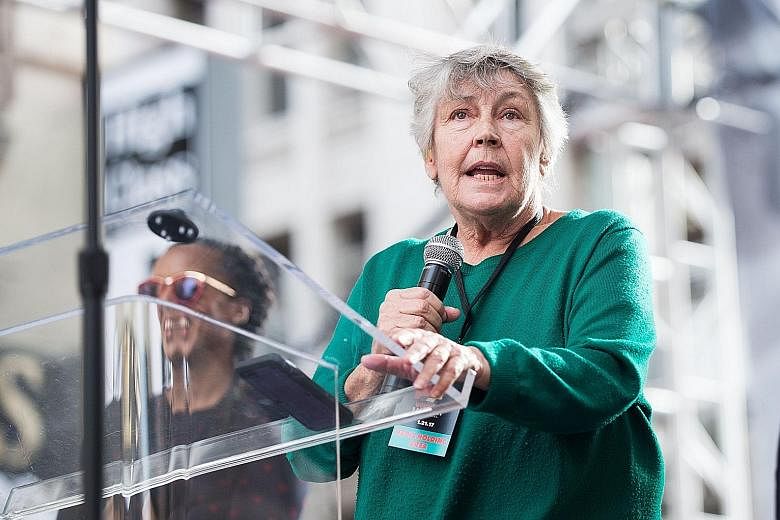LOS ANGELES • Helen Reddy, the Australia-born singer whose 1972 hit song I Am Woman became the feminist anthem of the decade and propelled her to international pop-music stardom, died on Tuesday in Los Angeles. She was 78.
The death was confirmed by her children in a message posted on her official fan page on Facebook. She suffered for decades from Addison's disease (she had a kidney removed when she was 17) and since at least 2015, from dementia.
I Am Woman reached No. 1 on the Billboard charts at the end of 1972 - a good six months after it was released. Individual call-in requests helped build radio play and the song earned her a Grammy Award for best female pop vocal performance.
She was the first Australia-born artist to win a Grammy and make the Billboard 100 record charts. Some male observers called the song - beginning with the words "I am woman/Hear me roar/In numbers/ Too big to ignore," sung by a 1.6m tall soprano - angry, man-hating, dangerous or all three.
"That simply underlined the many things women needed liberating from," a writer for Variety reflected last year. "Nobody called Sinatra a menace when he sang My Way, a no less straightforward hymn to selfdetermination."
During the 1970s, three of Reddy's songs - including Delta Dawn and Angie Baby - went to No. 1 on the Billboard chart. Three others - Ain't No Way To Treat A Lady, You and Me Against The World and Leave Me Alone (Ruby Red Dress) - made the Top 10.
More than three decades later, The Chicago Tribune declared her the "queen of '70s pop".
Helen Maxine Lamond Reddy was born on Oct 25, 1941, in Melbourne, the only child of Max Reddy, a writer, producer and actor; and Stella (Lamond) Reddy, an actress whose stage name was Stella Campbell. Her father was in New Guinea, serving in the Australian army, when she was born.
The Reddys performed on the Australian vaudeville circuit and Helen began joining them on stage when she was four. At 12, she rebelled by quitting show business and going to live with an aunt while her parents toured.
But her financial situation - after an early marriage, parenthood and divorce - persuaded her to return. She had a solid reputation in Australian television and radio when she won a 1966 talent contest sponsored by Bandstand, a Sydney pop-music television show. The prize was a trip to New York City and a record-company audition there.
The audition did not pan out and her career got off to a slow, discouraging start. Before Capitol Records signed her in 1970, at least 27 record labels rejected her, and she and her new husband, Jeff Wald, who was now her manager, moved - first to Chicago, then to Los Angeles.
Times were hard, especially when the couple lived in New York. In The Woman I Am: A Memoir (2006), she wrote: "When we did eat, it was spaghetti, and we spent what little money we had on cockroach spray."
Her first hit was a 1971 cover of I Don't Know How To Love Him, a hit from the award-winning stage show Jesus Christ Superstar. The success of I Am Woman, with Reddy's lyrics and Ray Burton's music, came a year later.
She was a frequent guest in the early 1970s on variety, music and talk shows such as The Mike Douglas Show, The Carol Burnett Show, The David Frost Show, The Merv Griffin Show and The Glen Campbell Goodtime Hour. The Helen Reddy Show (1973) was an eight-episode summer replacement series on NBC.
She made her big-screen debut in the disaster movie Airport 1975 (1974) as a guitar-playing nun who comforts a sick little girl (Linda Blair) on an almost certainly doomed 747. She always liked to point out that Gloria Swanson and Myrna Loy were also in the cast.
That was followed by a starring role in the Disney movie Pete's Dragon (1977) as a sceptical New England lighthouse keeper who doubts an orphaned boy's stories about his animated fire-breathing pet.
Reddy's Broadway career consisted of replacing the lead in Blood Brothers, a musical set in Liverpool, for a few months in 1995. But she had a busy stage career elsewhere, starring in productions of Anything Goes, Call Me Madam and Shirley Valentine in England and in the United States, from Provincetown to Sacramento.
Her last song to make the American charts was I Can't Say Goodbye To You (1981) and Imagination (1983) was her last album. Her final screen appearance was in The Perfect Host (2010), a crime comedy with David Hyde Pierce.
Reddy married and divorced three times. In 1961, she married Kenneth Claude Weate, an older musician who was a family friend. They had a daughter and divorced in 1966.
In 1968, she married Wald, and they had a son. They separated in 1981, when he checked into a treatment facility for cocaine addiction, and divorced two years later. That same year, she married Milton Ruth, a drummer in her band. They divorced in 1995.
Survivors include her two children, Traci Wald Donat, the daughter from her first marriage, and Jordan Sommers, the son from her second; her half-sister, Toni Lamond, an Australian singer-actress; and a grandchild.
NYTIMES

